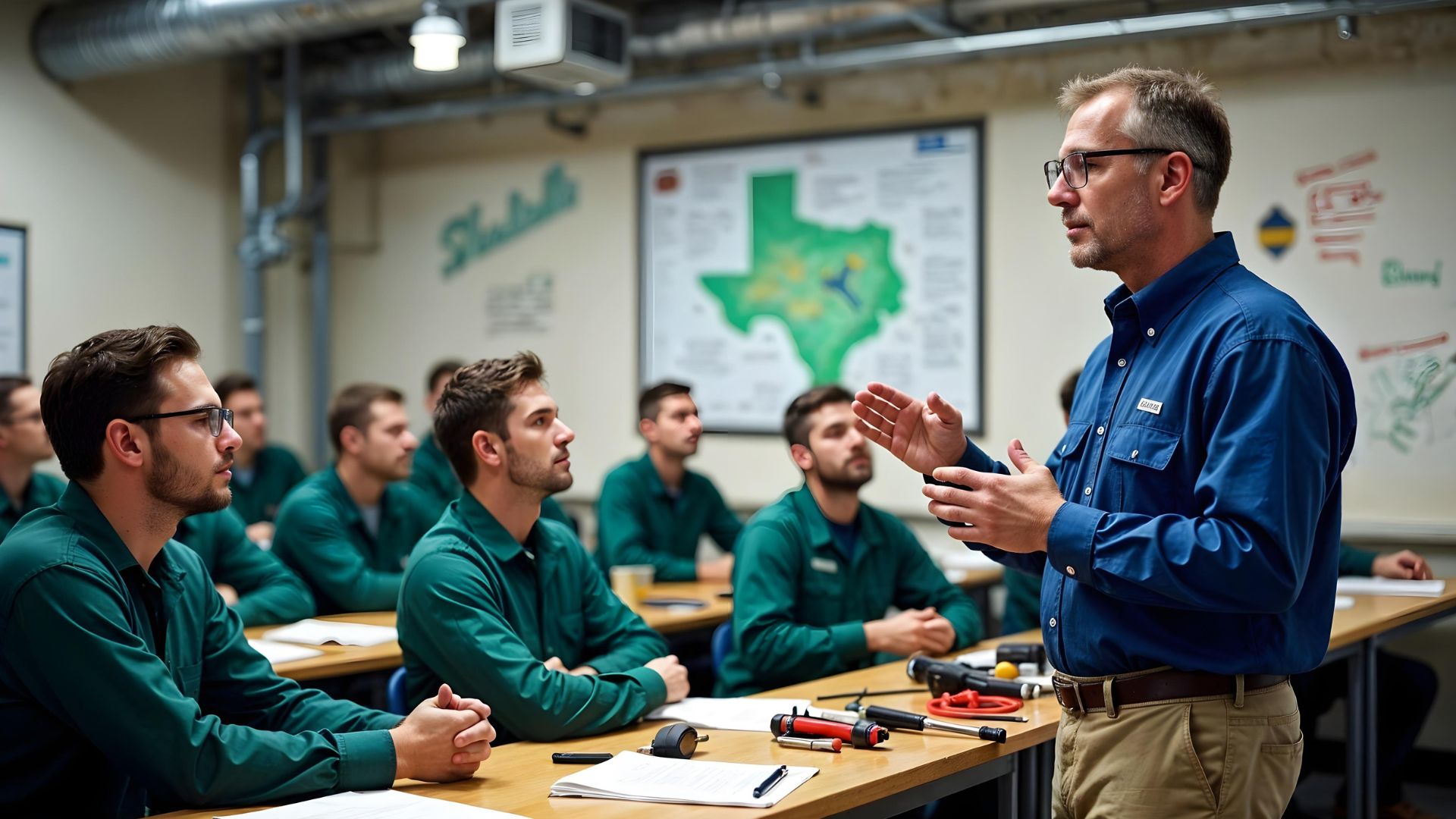Texas HVAC continuing education is essential for compliance with state regulations, career advancement, and keeping up with industry changes. This education helps professionals renew their licenses, stay competitive, and enhance their skills. Read on to discover why continuing education in Texas HVAC is essential for HVAC contractors in Texas.
Key Takeaways
- Continuing education is essential for Texas HVAC professionals to stay competitive, adapt to industry changes, and enhance customer satisfaction.
- Regulatory compliance requires HVAC technicians in Texas to complete specific continuing education hours, ensuring they remain informed about legal standards and best practices.
- Flexible and cost-effective training options, including online courses and on-the-job training, make ongoing education accessible for HVAC professionals seeking career advancement. This training is crucial for understanding and implementing energy efficient systems, which are increasingly in demand as regulations evolve.
The Importance of Continuing Education for HVAC Professionals in Texas
In the thriving HVAC sector, continued education is essential rather than optional. In Texas, HVAC professionals understand that persistent educational pursuits are key to furthering their careers and remaining ahead in a constantly evolving industry. Participating in continuing education for Texas HVAC equips technicians with enhanced abilities and opportunities for professional growth.
The realm of HVAC is fluid, continually influenced by the advent of new technologies and shifts in consumer demands. Through ongoing training programs, those within the field can stay current with these trends, ensuring the delivery of superior services to customers—a critical component for sustaining an advantage over competitors.
For any technician working within the realm of heating, ventilation, and air conditioning (HVAC), exhibiting confidence and precision is imperative. The commitment to continuous learning cultivates these attributes, which translates into better job performance, leading directly to improved client satisfaction levels—this often results in return clientele reinforcing one’s standing within this robust market.
Those who prioritize continual learning are more apt at tackling real-world issues encountered in HVAC systems comprehensively. Such expertise elevates their problem-solving capabilities, rendering them significant contributors to any enterprise operating within this space.
Investing time into continuing education ultimately serves as a conduit towards career progression while concurrently keeping service standards high—it ensures individuals remain knowledgeable leaders amongst peers engaged actively within Texas’ vibrant landscape catering toward efficient climate control solutions.
Adapting to Industry Trends and Technological Advances
The landscape of the HVAC industry is in a state of continuous transformation, propelled by advancements in technology and shifts in industry norms. It’s imperative for HVAC professionals to keep abreast with these changes to preserve their competitive edge. Continuous education serves as a conduit for technicians to remain aligned with the newest breakthroughs.
In light of escalating calls for eco-friendly and energy-saving solutions, training programs centered on cutting-edge HVAC systems and maximizing energy efficiency have gained prominence. Mastery over technologies associated with sustainable design and low-energy systems not only aligns with current market expectations but also paves the way for professional advancement.
Mastering novel tools and competencies such as intelligent thermostat technologies and comprehensive home automation is becoming par for the course within the residential and commercial sectors. It is vital that HVAC practitioners are adept at both the implementation and upkeep of these modern amenities.
Beyond structured educational modules, keeping pace with industrial trends involves engaging proactively in various learning forums like conferences, workshops, seminars, webinars, or digital discussions—enabling those within this field to acquire crucial insights while forging ahead professionally through skill enrichment.
It’s clear that embracing change within technological spheres helps maintain relevance among peers. Dedication to ongoing education is central to navigating forward successfully within the dynamic realm of HVAC services.
Regulatory Compliance and Licensing Requirements
In the HVAC sector in Texas, adherence to regulatory compliance and licensing stipulations is critical, mirroring the imperative of upholding elevated standards. To maintain their licensure, HVAC experts must undertake 8 hours of continuing education for license renewal. This curriculum must encompass a minimum of one hour devoted to understanding state mandates and regulations.
The oversight body known as the Texas Department of Licensing and Regulation (TDLR) enforces a biennial requirement for HVAC technicians to complete these educational sessions. Such directives guarantee that industry professionals consistently update themselves with evolving standards and best practices within their field.
For continuation courses to be valid towards fulfilling licensing prerequisites, it’s imperative that they are facilitated by providers sanctioned by the TDLR—courses from unapproved entities will not contribute toward satisfying mandatory hourly quotas necessary for renewing licenses, thus endangering legal work status for technicians.
Read more: Top Common Mistakes to Avoid When Renewing Your HVAC License
Types of HVAC Licenses in Texas (Class A, Class B, NATE, EPA)
In Texas, HVAC professionals can pursue various licenses and certifications to enhance their career prospects and ensure compliance with industry standards. The two primary types of HVAC licenses in Texas are Class A and Class B, each with specific requirements and limitations.
Steps to Get an HVAC License in Texas
Obtaining an HVAC license in Texas involves several steps, each designed to ensure that professionals are well-prepared to meet industry standards and provide high-quality service. Here’s a comprehensive guide to help you navigate the process:
Enhancing Technical Expertise and Safety Protocols
HVAC training programs emphasize the importance of both technical expertise and strict adherence to safety protocols. These comprehensive educational courses are designed to develop both practical abilities and interpersonal skills, ensuring that HVAC technicians become competent in all aspects of their profession.
The value of hands-on experience and simulations is underscored heavily within these training regimens, as they serve to solidify theoretical knowledge while building confidence among trainees. Mentorship plays a crucial role here by imparting systematic problem-solving techniques and promoting critical thinking skills essential for real-world applications.
Key components such as mastering electrical systems, honing troubleshooting capabilities, and effectively utilizing diagnostic equipment are integral for identifying issues with HVAC systems promptly and accurately. Ongoing education is pivotal in maintaining high levels of competency amongst HVAC professionals in these key areas, thereby optimizing the quality of service provided.
Adherence to established safety protocols forms an imperative part of any reputable HVAC training program. The emphasis on proper instruction ensures that technicians can conduct operations without harm or hazard, significantly decreasing the likelihood of accidents whilst boosting overall job efficiency. Continuing education keeps professionals abreast with evolving regulations concerning safe practices within the industry.
In summation, regular updates through ongoing education coupled with rigorous skill enhancement ensure that trained individuals evolve into highly capable experts prepared not only for adeptly addressing various challenges associated with working on HVAC installations but also for doing so securely every time they step onto a job site.
Improving Customer Satisfaction and Service Quality
Ensuring customer satisfaction is fundamental for the success of any HVAC business, and it’s greatly influenced by continuous education aimed at elevating service standards. This educational advancement facilitates HVAC professionals’ ability to swiftly embrace novel technologies and meet regulatory demands, culminating in outstanding service provision.
It’s imperative that training schemes encompass both the technical aspects and elements of customer relations. When HVAC technicians can effectively identify and satisfy client expectations, they elevate their level of service, which translates into greater customer satisfaction and loyalty. A holistic training strategy guarantees that technicians are not just technically adept but also proficient in engaging with customers.
The commitment to enhancing skills through ongoing HVAC instruction betters quality services as technicians gain practical abilities necessary for promptly addressing consumer issues. Through hands-on experience during such training programs, HVAC experts hone these competencies, thereby becoming more efficient in their positions—resulting in faster, reliable solutions for clients and increasing their satisfaction with the service received.
Incorporating mentorship within these educational settings provides trainees with invaluable perspectives on troubleshooting complex situations from seasoned veterans. Improving newcomers’ capabilities to offer unparalleled service experiences.
To summarize, persistently pursuing education stands as a linchpin for fostering increased consumer gratification and elevating overall service quality within an organization. The dedication shown towards honing the expertise of HVAC personnel assures excellence in service—an outcome generating joyous clientele while nurturing a flourishing enterprise.
Flexible Learning Options for HVAC Continuing Education
In the HVAC industry, adaptability is essential, especially when it comes to continuing education. Thankfully, a plethora of flexible learning modalities are at the disposal of HVAC professionals, including online and self-paced educational programs.
A wide range of state-approved providers offer online continuing education courses that afford HVAC professionals the opportunity to progress through their learning autonomously. These approved courses comply with regulatory standards, ensuring that technicians acquire pertinent knowledge for license renewal without concerns about meeting official criteria.
The convenience provided by online learning is one of its main benefits, as it permits access around the clock. This attribute enables those in the profession to weave their educational pursuits into often hectic timetables, effectively juggling work duties with familial obligations.
Self-directed pacing stands out as another pivotal advantage offered by these digital courses – allowing each technician to absorb course content thoroughly before advancing, which ensures optimal assimilation of skills and expertise necessary for encountering future vocational challenges robustly equipped.
By offering readily accessible options that align seamlessly with individual schedules and needs, online and autonomous study avenues substantially simplify the pursuit of continuous professional development for those within the realm of heating, ventilation, and air conditioning (HVAC), promoting sustained industry excellence and advancement.
Cost-Effective Training Solutions
HVAC technicians don’t have to spend a fortune to advance their skills. Affordable continuing education options are readily available, making ongoing learning accessible for all.
Offering significant savings, online courses start at just $14.95 and provide top-notch instruction akin to traditional in-person classes but without the additional costs associated with travel and overnight stays.
On-the-job training is yet another economical approach. By leveraging the workplace itself as an educational environment, it sidesteps the need for costly external classroom facilities while allowing HVAC professionals to gain practical experience during regular work hours—minimizing lost time and bolstering efficiency.
In-house training programs Slash expenses by eliminating out-of-pocket costs for commuting or accommodation. Training can be woven into standard working schedules, facilitating seamless integration of professional development within daily operations tailored directly to each unique requirement of the HVAC business.
These financially sensible education pathways offer HVAC specialists avenues to enhance their expertise minus monetary concerns—demonstrating that ongoing skill enhancement remains a strategic investment attainable by every technician in this field.
Resources for HVAC Training and Education
To excel in the HVAC industry, continuous learning and professional development are essential. Fortunately, there are numerous resources available in Texas to help HVAC professionals stay current with industry standards and enhance their skills.
How to Start Your Texas HVAC Continuing Education Journey
Initiating your journey in Texas HVAC continuing education is a simple process that commences with enrolling online. Various authorized platforms, including StateApproved.com, provide convenient entry points tailored to comply with the standards of the Texas Department of Licensing and Regulation (TDLR) for securing your HVAC license in Texas.
It’s imperative to select an appropriate HVAC school and program thoughtfully. Considerations such as course content, instructor qualifications, and opportunities for practical training are key factors. A well-researched decision can lead you to a program that not only aligns with your professional aspirations but also furnishes you with essential skills within the industry.
Many community colleges foster cooperative relationships with local enterprises, offering internships and employment prospects that significantly enrich educational outcomes. These symbiotic connections provide hands-on experiences that prove priceless within the sphere of HVAC workmanship. Utilizing these affiliations could greatly propel one’s vocational trajectory.
Diligently maintaining personal records along with consistent liaison helps ensure complete recognition by TREC for courses undertaken toward continuing licensing requirements. Allocating dedicated weekly study periods towards ongoing education simplifies learning processes by breaking them into manageable segments, thus mitigating potential stressors associated with them.
Those entering this field may benefit from scholarships specifically aimed at easing monetary strains on students pursuing hvac studies — a critical resource aiding future hvac professionals in undertaking their instructional paths bolstered by both confidence and financial assistance.
The Role of Employers in Supporting Continuing Education
Support from employers is vital in the professional development of HVAC technicians, as they underwrite training initiatives that bolster both individual competencies and collective business prowess. Customized internal training programs are particularly beneficial, addressing the distinct demands of an HVAC enterprise while optimizing educational impact.
Enlisting seasoned professionals for mentorship roles within these programs also proves advantageous. Their direct involvement offers newer technicians personalized insights and tutelage conducive to skill sharpening and confidence building—effectively transmitting institutional wisdom throughout the workforce.
Incentives such as financial assistance for Education or bonuses tied to achieving additional certifications propel HVAC specialists toward continued academic endeavors. Complementarily, non-financial rewards like acknowledgment frameworks or prospects for career progression serve to promote sustained intellectual growth and capability enhancement.
Cultivating a workplace ethos where continuous learning thrives can lead to greater employee satisfaction and loyalty. The nurturing of this environment aids in fostering personnel commitment while simultaneously enhancing company operations due directly to higher degrees of worker contentment with their employment circumstances.
Employers who champion ongoing education not only accelerate their employees’ success but also elevate their own businesses’ standing. By committing resources towards facilitating continual knowledge acquisition among staff members, organizations maintain a robustly trained team eager to excel professionally.
Key Certifications and Their Benefits
Certifications in the HVAC industry are critical for a thriving career and adherence to safety protocols. For instance, HVAC professionals in Texas must obtain certifications such as the EPA Section 608, which is federally required and confirms their ability to manage refrigerants safely.
In the realm of professional recognition within this field, NATE certification stands out prominently. Recognized throughout the HVAC community, it signifies an HVAC technician’s proficiency and can substantially improve both employment opportunities and salary prospects. Both employers and customers tend to favor technicians with this accreditation due to its affirmation of a technician’s skillset and dependability.
HVAC Excellence certifications offer standardized benchmarks for competencies across assorted disciplines within HVAC services. These qualifications reflect an individual’s expertise and dedication towards their craft while also enhancing prospects for upward mobility in their careers.
Achieving certification allows these skilled workers to command more substantial compensation packages that mirror their expert capabilities. Through pursuing these notable credentials, both individual contractors and larger entities within the profession stand poised to significantly elevate future job roles alongside financial rewards.
For those navigating careers in heating, ventilation, and air conditioning (HVAC), acquiring pivotal certificates remains indispensable — securing compliance with prevailing standards whilst opening doors for greater occupational development chances.
Read more: Getting Your HVAC Certification—How Long Does It Take?
Measuring the Effectiveness of Continuing Education Programs
Ensuring that continuing education programs for HVAC professionals deliver anticipated results and value is vital. Evaluating these training initiatives can be effectively done using models like Kirkpatrick’s Four-Level Training Evaluation Model, which enjoys widespread recognition.
It’s imperative to establish learning objectives that are both specific and measurable when assessing the success of such training efforts. These goals provide a blueprint for expected outcomes and aid in gauging program effectiveness. Continual review of these objectives guarantees that the training remains effective and pertinent.
Another key component in evaluating program effectiveness lies in gathering feedback from participants. Their insights reveal what aspects resonate well as well as those requiring enhancement. By addressing areas for improvement, HVAV professional development through these programs can adapt and improve over time.
Groups such as ISPI offer valuable resources aimed at determining performance metrics while also calculating the return on investment (ROI) associated with educational offerings. Applying these tools allows organizations to comprehend financial gains stemming from their commitment to ongoing educational investments.
Consistent assessment paired with subsequent refinement ensures continued excellence within HVAC continuing education initiatives, benefiting individual professionals as much as it does their industry collectively—maintaining rigorous standards synonymous with enduring achievement.
Future Trends in HVAC Continuing Education
Emerging technologies, specifically virtual reality (VR) and augmented reality (AR), are at the forefront of transforming HVAC continuing education. These technologies enable interactive and deeply engaging training experiences that significantly enhance learning outcomes.
HVAC technicians now have access to VR-based training, which replicates building environments and various HVAC system scenarios for hands-on practice without real-world risks. This technology allows for the creation of accurate simulations where technicians can hone their diagnostic skills within a safe yet realistic setting.
Augmented Reality provides an additional layer by projecting digital data onto physical objects during technical exercises. For HVAC professionals, AR serves as an instructional tool that simplifies complex systems comprehension through visualization, making knowledge acquisition more intuitive.
As advancements occur in smart home applications and energy-efficient solutions alongside sophisticated diagnostic equipment, these skills become increasingly vital for modern HVAC professionals. The integration of progressive educational methods like VR and AR is critical in equipping them to meet forthcoming industry demands proficiently.
The trajectory for continued education within the hvac sector looks promising, with technological developments poised to fundamentally redefine traditional approaches. By embracing such innovations, hvac experts remain at the forefront of technological proficiency in their discipline.
Summary
The HVAC industry is greatly enriched by the continuous learning and professional development of its workers. Keeping abreast with evolving industry trends and advancements in technology, HVAC professionals are equipped to sustain a competitive advantage while delivering top-notch services to their clientele.
Attaining compliance with regulations and acquiring essential certifications is critically important. These qualifications affirm that HVAC technicians meet established standards within the industry, potentially boosting their career opportunities and financial prospects.
Continuing education for Texas HVAC professionals has been made more approachable thanks to flexible training methods that cater to different preferences, including online courses as well as in-house or on-the-job training options that accommodate varying schedules.
Employer engagement is pivotal for fostering an environment committed to ongoing education. By allocating resources towards employee development, organizations contribute not just toward individual growth but also increase job satisfaction levels and cultivate successful business outcomes.
In essence, Texas HVAC continuing education stands at the heart of occupational progression and sectoral proficiency. Through consistent investment in educational advancement, those working within this field secure themselves a pathway for sustained success amidst a dynamic professional landscape.
For those looking to embark on or continue their HVAC education journey, we at State Approved Continuing Education offer a range of comprehensive and flexible courses designed to meet the needs of busy professionals. Our state-approved programs, with convenient online access, keep you current with industry standards, helping you advance your career as an electrician, property tax consultant, or tow operator. Contact us today to explore your options and take the next step in your HVAC career. For detailed information on renewing your visit, TDLR HVAC license.
Read more: Top Reasons to Start Your HVAC Continuing Education Early in Texas
Frequently Asked Questions
How can participants start the Texas CE courses?
Participants can begin the Texas CE courses by registering online at their convenience. This provides flexibility in starting their education.
What is required to obtain a course completion certificate?
To obtain a course completion certificate, you simply need to complete the course, after which you can print the certificate yourself.
What type of learning materials are used in the Texas CE courses?
Texas CE courses utilize easy-to-digest study materials and engaging videos to enhance the learning experience. These resources are designed to facilitate understanding and retention of the course content.
Are tests required for the Texas CE courses?
Tests are not required for Texas Continuing Education courses. You can focus on completing the courses without the pressure of assessments.






